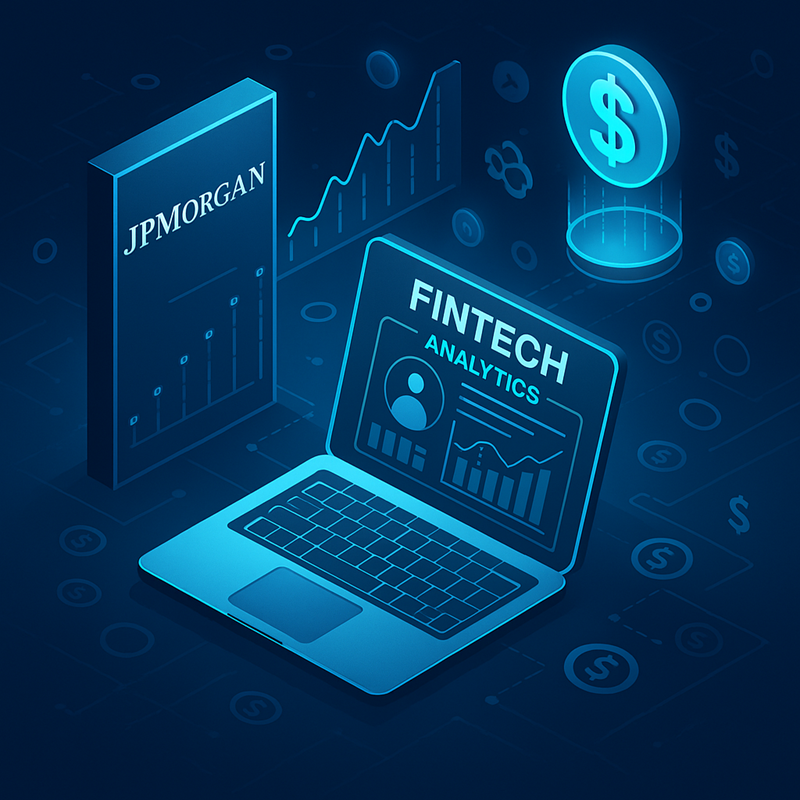JPMorgan to Monetize Customer Data for Fintech Companies
In a bold move that could reshape the financial technology landscape, JPMorgan Chase is reportedly set to begin charging fintech companies for access to its vast customer data starting in 2025. This strategic decision not only exemplifies the increasing value of data in the financial sector but also positions JPMorgan as a key player in monetizing valuable consumer insights.
As fintechs become more integral to modern banking, this approach opens up new revenue streams for traditional banks while providing fintech partners with invaluable insights that could enhance their services. Let’s explore the implications of this plan for both JPMorgan and the broader financial services industry.
The Rationale Behind the Move
In today’s data-driven world, customer information is one of the most precious assets a company can possess. For JPMorgan, leveraging its extensive dataset is a natural progression as it seeks to maintain its competitive edge. The decision to charge fintech companies reflects a growing trend where financial institutions are recognizing the monetization potential of customer data.
Key motivations for JPMorgan include:
- Enhanced Revenue Streams: By charging fintech firms for data access, JPMorgan can create new avenues for profitability.
- Strengthening Partnerships: The initiative may foster closer relationships with fintech companies, as data collaboration could drive mutual growth.
- Staying Competitive: Offering customer insights positions JPMorgan ahead of other banks that may not monetize their data effectively.
What This Means for Fintech Companies
The implications of JPMorgan’s data monetization strategy are significant for fintech companies. Accessing rich customer data can profoundly impact how these firms operate and innovate. Here are several ways that this initiative can benefit fintechs:
1. Enhanced Product Development
By utilizing JPMorgan’s customer insights, fintech companies can tailor their offerings more precisely to meet consumer needs. This access enables them to:
- Identify market trends and customer preferences.
- Create targeted marketing strategies that resonate with specific demographics.
- Refine existing products based on actual customer behavior and feedback.
2. Improved Customer Experience
Fintech companies thrive when they can provide seamless, user-friendly experiences. Access to JPMorgan’s data will empower these firms to:
- Personalize user journeys, enhancing engagement and satisfaction.
- Introduce customized financial solutions based on individual needs.
- Utilize predictive analytics to stay ahead of customer expectations.
3. Greater Competitive Advantage
The financial sector is highly competitive, and insights derived from data can be a game changer. Fintech companies that leverage JPMorgan’s data can:
- Differentiate their services in a crowded market.
- Anticipate risks and adjust strategies accordingly.
- Achieve better compliance and regulatory alignment through informed decision-making.
Challenges Ahead
While the advantages of accessing JPMorgan’s customer data are substantial, fintech companies must also navigate several challenges:
1. Cost Considerations
Depending on JPMorgan’s pricing strategy, the cost of accessing data could impact the finances of smaller fintech firms. They will need to:
- Conduct a cost-benefit analysis to determine if the investment in data is justified.
- Explore creative financing options or partnerships to offset costs.
2. Data Privacy Concerns
As fintechs gain access to sensitive consumer data, they must maintain stringent data privacy standards. This entails:
- Adhering to existing data protection regulations such as GDPR and CCPA.
- Implementing robust cybersecurity measures to safeguard customer information.
3. Integration Challenges
Incorporating new data streams into existing systems can prove complex. Fintech companies should prepare for:
- Investing in technology and infrastructure capable of handling and analyzing large datasets.
- Hiring data scientists or analysts to extract actionable insights effectively.
The Future of Data Monetization in Banking
JPMorgan’s initiative presents a significant milestone in the evolving landscape of banking and fintech collaboration. As traditional banks seek to monetize their customer data, it has the potential to redefine partnerships between banks and fintechs. Further developments may include:
1. Expansion of Data Services
As fintechs demonstrate the value of data-driven insights, there could be a surge in demand for similar services from other financial institutions. JPMorgan may pave the way for:
- Creating a blueprint that other banks will follow in monetizing data.
- Innovating new data products tailored specifically for fintech needs.
2. Enhanced Industry Collaboration
Data-sharing agreements could lead to stronger partnerships between banks and fintechs, contributing to the development of innovative financial solutions.
Conclusion
JPMorgan Chase’s plan to monetize customer data signals a transformative shift in the financial services sector. By leveraging valuable insights, fintech companies can enhance their offerings and provide superior customer experiences. However, navigating the associated challenges will be crucial for success.
Read also: Young Canadians Pursue Passive Income Amid Wealth Realities
As we look to the future, the interplay between traditional banks and fintechs will likely redefine how personal finance is managed and experienced. JPMorgan is not just adapting to this change; it is actively shaping the future of financial services in the process. The opportunity is ripe for innovation, and those who harness the power of data effectively will lead in this increasingly competitive landscape.


